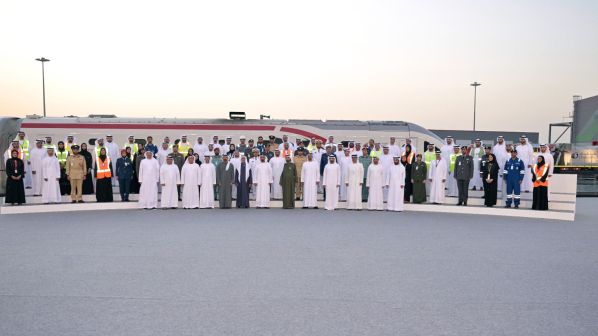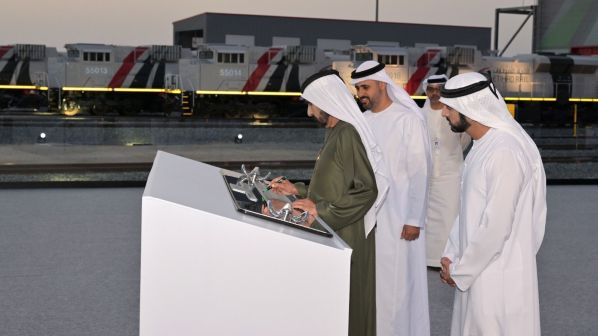SHEIKH Mohammed bin Rashid Al Maktoum, vice-president and prime minister of the United Arab Emirates (UAE) and ruler of Dubai, officially launched the UAE freight rail network during a ceremony held at the main control and maintenance centre in Al Fayan, Abu Dhabi, on February 23.
The second phase of the Etihad Rail network stretches for 900km from Ghuweifat on the border with Saudi Arabia in the east to Fujairah in the west. The network connects four major ports and seven logistics zones located at Ruwais, Industrial City of Abu Dhabi (ICAD), Khalifa Port, Dubai Industrial City, Jebel Ali Port, Al Ghail and Fujairah Port.
Construction was split into four work packages and work on the first commenced in February 2020. The project required the construction of 593 bridges and crossings, and nine tunnels with a length of 6.5km, while 120 million m3 of material was excavated. The standard-gauge network is equipped with ETCS Level 2. Eleven contractors, 25 consultants, and 28,000 specialists worked on the project. It took 133 million working hours to complete, and 40,000 approvals from 180 government agencies.
Al Maktoum described the project to connect the seven Emirates as strengthening “our capabilities and competitiveness and consolidating our unity.”
Sheikh Theyab bin Mohamed bin Zayed Al Nahyan, member of the Abu Dhabi Executive Council and chairman of Etihad Rail, praised the work of Emiratis to deliver the new railway network.
“Thanks to them, we won the bet, and we succeeded in launching a railway network with international specifications that extends to about 900km across the Emirates,” he says.
The network is operated with a fleet of 38 3.4MW EMD SD70 locomotives supplied by Progress Rail and 1000 wagons supplied by CRRC. Contracts have been signed with freight customers including Stevin Rock and Borogue, and the network is expected to carry 60 million tonnes of freight a year, contributing Dirhams 200bn ($US 54.45bn) to the UAE economy. It will also reduce road transport emissions by 21% initially and by 40% by 2050.
No launch date has been confirmed for the start of passenger services on the network. Etihad Rail has ordered push-pull train fleets from CAF and CRRC and Al Maktoum posted pictures of himself and other UAE dignitaries following a ceremony onboard a pilot passenger train that was delivered to the UAE in 2022. The first phase of the UAE national network, the 264km line from Habshan to Shah and Ruwais, opened in 2016.

Abu Dhabi sovereign wealth fund to support Oman-UAE rail project
Meanwhile, Oman-Etihad Rail, the company overseeing a project to build a new railway between the two countries, has signed a cooperation agreement with Abu Dhabi sovereign wealth fund Mubadala to support development of the $US 3bn project.
Oman-Etihad Rail was established in September with the objective of constructing a 303km cross-border railway from the port of Sohar on the Gulf of Oman to the UAE’s national network at Abu Dhabi via Al Ain.
Under the agreement the partners will form working groups and joint committees to benefit from shared expertise and knowledge, combine efforts to develop economic and financial feasibility studies as well as joint investment to develop the railway project and enhance its added value.
“The signing of the cooperation agreement between Oman-Etihad Rail and Mubadala reflects the commitment of both parties to building strategic partnerships and strengthening cooperation with leading entities to promote investment, economic growth, and comprehensive development in both countries,” says UAE minister of energy and infrastructure and chairman of Oman-Etihad Rail, Mr Suhail bin Mohammed Faraj Faris Al Mazrouei.
“The agreement will contribute to enhancing and developing the national economy in the UAE and the Sultanate by improving supply chain efficiency, opening new cross-border trade opportunities, and providing safe and sustainable means of transport by rail for passengers and goods.”
Diesel passenger trains are envisaged to operate at up to 200km/h and freight trains at up to 120km/h on the new line. No schedule has yet been confirmed for delivery of the project.
Etihad Rail signed a contract with CRRC for the supply of three push-pull diesel passenger trains earlier this month with an option for up to 20 of the 200km/h sets. The manufacturer says it expects the trains to enter service in 2025.
For detailed data on rail projects from around the world, subscribe to IRJ Pro.
The January edition of IRJ included an update on Etihad Rail’s work to build a national railway network in the UAE. Digital subscribers can read the article here.

